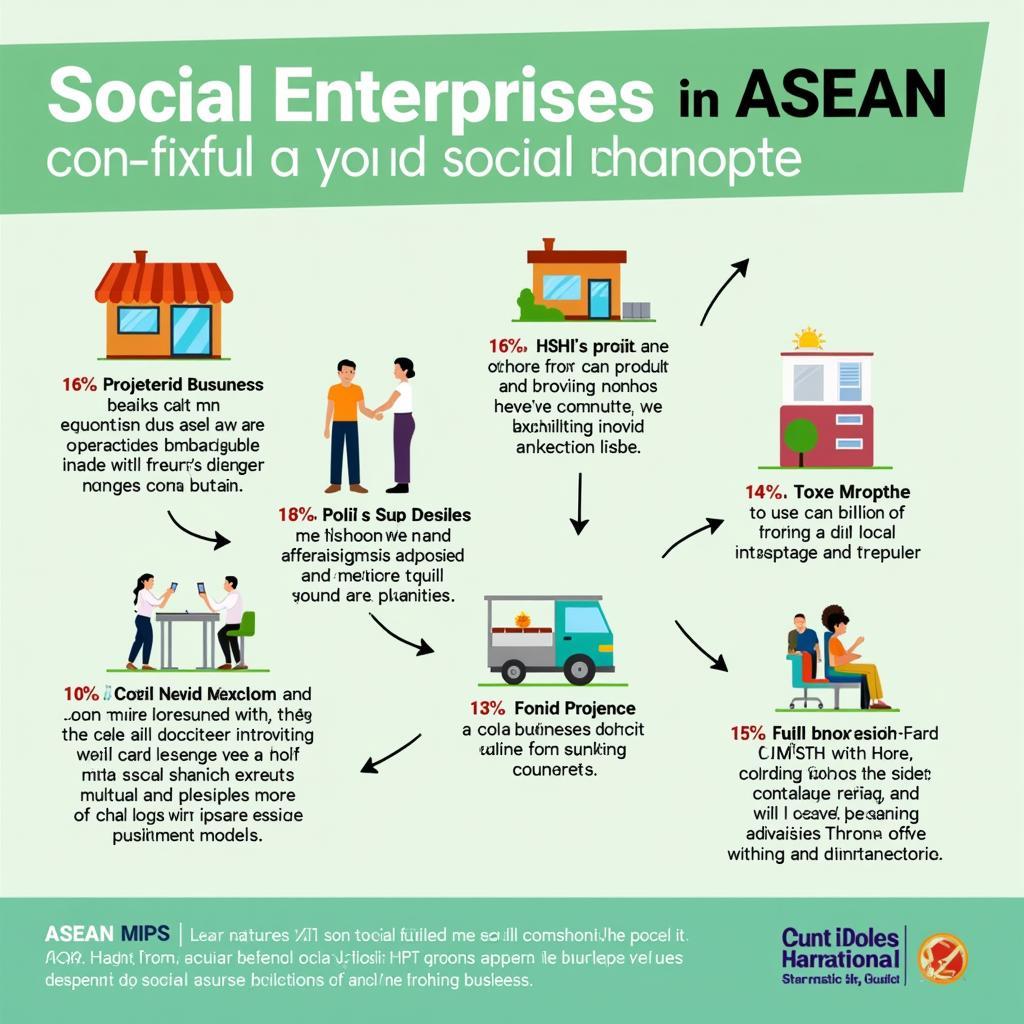ASEAN social impact is a multifaceted topic encompassing economic development, environmental protection, and socio-cultural advancement. The region’s diverse cultures, rapid economic growth, and evolving social landscape present both challenges and opportunities for achieving meaningful social impact. This article explores the various dimensions of ASEAN’s social impact, highlighting key initiatives, challenges, and future prospects.
Understanding ASEAN’s Diverse Social Landscape
The Association of Southeast Asian Nations (ASEAN) comprises ten distinct nations, each with its unique cultural heritage, socio-economic context, and developmental priorities. This diversity, while a source of richness and dynamism, also presents complexities in addressing social issues across the region. Understanding these nuances is crucial for effectively measuring and enhancing ASEAN social impact. Key factors shaping the social landscape include varying levels of economic development, access to education and healthcare, and the presence of marginalized communities. These factors influence the specific needs and priorities of each nation and require tailored approaches to achieve positive social change.
Economic Development and its Social Implications
Economic growth has been a significant driver of social progress in ASEAN. Rapid industrialization and urbanization have led to improved living standards for many, but have also created social disparities. Addressing issues like income inequality, access to quality education and healthcare, and decent work conditions is crucial for ensuring inclusive and sustainable development. Furthermore, promoting ethical business practices and corporate social responsibility plays a vital role in maximizing the positive social impact of economic growth.
The Role of SMEs in Driving Social Change
Small and medium-sized enterprises (SMEs) are the backbone of ASEAN economies and play a crucial role in driving social change. Supporting SME growth through access to finance, technology, and market opportunities can empower local communities and create sustainable livelihoods. Moreover, fostering innovation and entrepreneurship within the SME sector can lead to the development of solutions that address pressing social challenges.
 ASEAN SME Social Entrepreneurship
ASEAN SME Social Entrepreneurship
Environmental Sustainability and Social Responsibility
Environmental challenges, such as climate change, deforestation, and pollution, pose significant threats to the social well-being of ASEAN communities. Promoting sustainable environmental practices is crucial for ensuring long-term social and economic stability. This includes transitioning to renewable energy sources, protecting biodiversity, and implementing effective waste management systems. Furthermore, fostering environmental awareness and promoting responsible consumption patterns among citizens is essential for achieving lasting positive change.
Balancing Economic Growth with Environmental Protection
Balancing economic growth with environmental protection is a key challenge for ASEAN. Finding sustainable development pathways that minimize environmental impact while maximizing social and economic benefits is crucial. This requires collaborative efforts between governments, businesses, and civil society organizations to implement effective policies and promote responsible practices.
Dr. Anya Sharma, an environmental economist specializing in Southeast Asia, emphasizes the importance of a holistic approach: “ASEAN’s social impact cannot be separated from its environmental performance. Sustainable development requires a balanced approach that considers both economic growth and ecological preservation.”
Empowering Communities through Education and Healthcare
Investing in education and healthcare is fundamental to improving ASEAN social impact. Access to quality education empowers individuals with the knowledge and skills necessary to contribute to society and improve their livelihoods. Similarly, access to affordable and quality healthcare is essential for ensuring the well-being of communities and reducing health disparities. Strengthening public health systems and promoting preventative healthcare measures can significantly improve the overall social landscape.
The Importance of Digital Literacy in the 21st Century
In today’s increasingly digital world, digital literacy is becoming a critical skill for individuals to participate fully in society and the economy. Bridging the digital divide and ensuring equitable access to technology and digital literacy training is crucial for maximizing ASEAN’s social impact in the 21st century.
Conclusion
ASEAN social impact is a dynamic and evolving landscape. Addressing the region’s diverse social challenges requires collaborative efforts and innovative solutions. By prioritizing inclusive economic growth, environmental sustainability, and investments in education and healthcare, ASEAN can unlock its full potential and create a more equitable and prosperous future for all its citizens. The asea manifestacion de impacto ambiental is a key element in understanding the challenges and opportunities in the region.
FAQs
- What are the key drivers of ASEAN social impact?
- How does economic growth influence social outcomes in ASEAN?
- What are the major environmental challenges facing ASEAN?
- Why is education and healthcare crucial for improving ASEAN social impact?
- How can ASEAN achieve sustainable development?
- What role do SMEs play in driving social change in ASEAN?
- How can digital literacy contribute to positive social impact in ASEAN?
Scenarios:
Scenario 1: A young entrepreneur in Indonesia wants to start a social enterprise focused on providing sustainable and affordable housing solutions for low-income communities. What resources and support systems are available within ASEAN to help them launch and scale their venture?
Scenario 2: A rural community in the Philippines is facing the impacts of climate change, including increased flooding and droughts. How can ASEAN initiatives and regional collaborations support this community in adapting to these challenges and building resilience?
Further Questions and Resources:
- How can ASEAN further promote cross-border collaboration on social impact initiatives?
- What are the best practices for measuring and evaluating social impact in diverse ASEAN contexts?
- Explore additional resources on ASEAN’s social development agenda and initiatives.
Need Support? Contact us 24/7: Phone: 0369020373, Email: [email protected] or visit us at: Thôn Ngọc Liễn, Hiệp Hòa, Bắc Giang, Việt Nam.


